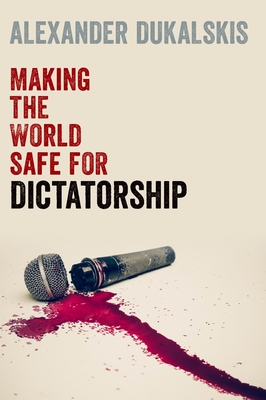Making the World Safe for Dictatorship

Making the World Safe for Dictatorship
Authoritarian states work hard to manage their images abroad. They invest in foreign-facing media, hire public relations firms, tout their popular celebrities, and showcase their successes to elite and popular foreign audiences. However, there is a dark side to these efforts that is sometimes overlooked. Authoritarian states try to obscure or censor bad news about their governments and often discredit their critics abroad. In extreme cases, authoritarian states intimidate, physically attack, or even murder their opponents overseas. All states attempt to manage their global image to some degree, but authoritarian states in the post-Cold War era have special incentives to do so given the predominance of democracy as an international norm. This book is about how authoritarian states manage their image abroad using both "promotional" tactics of persuasion and "obstructive" tactics of repression. Alexander Dukalskis looks at the tactics that authoritarian states use for image management and the ways in which their strategies vary from one state to another. Moreover, Dukalskis looks at the degree to which some authoritarian states succeed in using image management to enhance their internal and external security, and, in turn, to make their world safe for dictatorship. Making the World Safe for Dictatorship uses a diverse array of data, including interviews, cross-national data on extraterritorial repression, examination of public relations filings with the United States government, analysis of authoritarian propaganda, media frequency analysis, and speeches and statements by authoritarian leaders. Dukalskis also builds a new dataset--the Authoritarian Actions Abroad Database--that uses publicly available information to categorize nearly 1,200 instances in which authoritarian states repressed their critical exiles abroad, ranging from vague threats to confirmed assassinations. The book looks closely at three cases, China, North Korea, and Rwanda, to understand in more detail how authoritarian states manage their image abroad using combinations of promotional and obstructive tactics. The result is a new way of thinking about the international dimensions of authoritarian politics.
PRP: 530.10 Lei
Acesta este Pretul Recomandat de Producator. Pretul de vanzare al produsului este afisat mai jos.
477.09Lei
477.09Lei
530.10 LeiLivrare in 2-4 saptamani
Descrierea produsului
Authoritarian states work hard to manage their images abroad. They invest in foreign-facing media, hire public relations firms, tout their popular celebrities, and showcase their successes to elite and popular foreign audiences. However, there is a dark side to these efforts that is sometimes overlooked. Authoritarian states try to obscure or censor bad news about their governments and often discredit their critics abroad. In extreme cases, authoritarian states intimidate, physically attack, or even murder their opponents overseas. All states attempt to manage their global image to some degree, but authoritarian states in the post-Cold War era have special incentives to do so given the predominance of democracy as an international norm. This book is about how authoritarian states manage their image abroad using both "promotional" tactics of persuasion and "obstructive" tactics of repression. Alexander Dukalskis looks at the tactics that authoritarian states use for image management and the ways in which their strategies vary from one state to another. Moreover, Dukalskis looks at the degree to which some authoritarian states succeed in using image management to enhance their internal and external security, and, in turn, to make their world safe for dictatorship. Making the World Safe for Dictatorship uses a diverse array of data, including interviews, cross-national data on extraterritorial repression, examination of public relations filings with the United States government, analysis of authoritarian propaganda, media frequency analysis, and speeches and statements by authoritarian leaders. Dukalskis also builds a new dataset--the Authoritarian Actions Abroad Database--that uses publicly available information to categorize nearly 1,200 instances in which authoritarian states repressed their critical exiles abroad, ranging from vague threats to confirmed assassinations. The book looks closely at three cases, China, North Korea, and Rwanda, to understand in more detail how authoritarian states manage their image abroad using combinations of promotional and obstructive tactics. The result is a new way of thinking about the international dimensions of authoritarian politics.
Detaliile produsului








